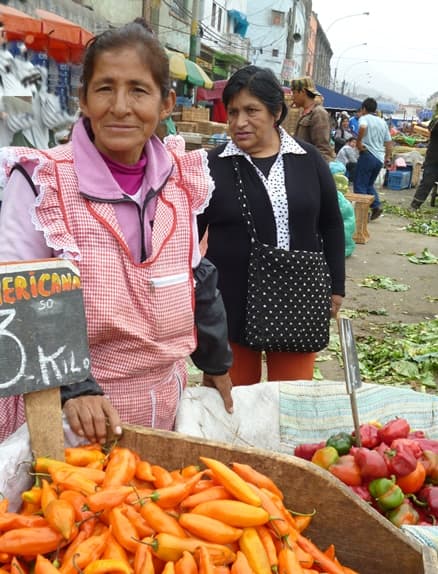(Lima, November 2013) For 25 years, Elba Rojas has sold chilis in Lima’s thriving wholesale market, La Parada. She says selling fresh produce here provided more income than she could have earned in a factory.

Elba was part of a community of more than 7,000 vendors who made their living in La Parada, assisted by a well-organized workforce of market porters. But things changed almost overnight when the city decided to relocate the wholesale market to an area less central. Construction of a public transport hub is a key factor in the relocation. Complaints from neighbouring residents that the market was a gathering place for rats, criminals and other undesirable elements also fed the decision.
Unfortunately, chaos and violence erupted when officials arrived to move the vendors out and set up barricades in late 2012. Accounts differ widely on who was responsible for the violence.
What Elba remembers most clearly about those terrible days was standing shoulder to shoulder with her fellow vendors and singing Peru’s national anthem while the police moved toward them. “I cried for a month,” she recalls.
Peace has been restored but barricades and a police presence remain, as do vendors like Elba. They continue to sell here at La Parada, pending resolution relating to market space for them closer to the new wholesale location. But since the disruption, more than half the vendors have gone – and so have the customers. Elba says her sales, and thus her income, have been dramatically reduced.
The hours she must work, however, have increased. Because fresh produce now is offloaded at the new market area far from this central area, she must leave home before 2 a.m. to get her day’s fresh chilis. She has to be back at La Parada by 4 a.m., because most of the customers who still come here come early.
Elba was initially excited about moving to the new market area – which the vendors refer to as “the promised land” – but controversy has opened up since the city made it clear that to get space there, vendors must first front a significant sum of money to cover a three year lease.
Now, she says, she might rather retire. “My bones hurt,” she says. But she is keenly aware that as a zone leader in her vendor organization, she has a responsibility to help with morale, and she does not want to let others down. So Elba perseveres, rising early, working as she always has, and drinking every day an herbal medicine concoction formulated by a fellow vendor to help her aching bones.